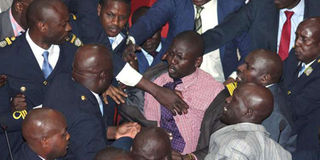Kenya must try to follow its own development visions

A scuffle at Nairobi's County Assembly on October 4, 2016. PHOTO | DENNIS ONSONGO | NATION MEDIA GROUP
What you need to know:
The dismantling of our national power reservoir in Nairobi and spreading it out extremely thinly on the ground to a myriad of power centres manned (as it turned out) by individual sharks notable neither for any social ideals nor for any technical skills, but only for their intense self-pursuits and consumer propensity.
That was where the interests of a class of foreigners forced us to sell for 30 pieces of silver all the ideals for which we had lost so many lives in our fight against European colonialism.
Though I have never seen a nuclear warhead, it must be a million times deadlier than a Kalenjin arrowhead, a Luo tong’, a Kikuyu simi, a Maasai lance. Every time I think of it, I find that nothing can be more hideous than the present-day examples of America’s nuclear warheads that pulverised Japan’s Hiroshima and Nagasaki at the end of the Second World War.
That, too, is the dilemma dogging humanity as our species approaches the middle of another century. Apparently sensitive to such temporal contradictions, the French language would have been goaded into commenting that the more social things change, the more humanity sinks into the same mental development groove of its own making. Plus ca change …
In conception, then, only barbarians should today still be fighting one another with what the upcountry correspondents of Kenya’s daily newspapers used to call “crude weapons”, namely, arrows, rungus and spears. Quite clearly, however, it all depends on what one means by the adjective “crude”.
Take the headline “Aggressive members turn county assembly chambers into battlefields” (page 10 of the Daily Nation of October 5). Of course. But, as a Shakespearean character used to plead, thou canst not say I did it. For, as you will remember, I once fought a lone, personally costly, but unsuccessful battle against just such utter wastefulness of political energy in a poor country like Kenya.
INTER-TRIBAL UNITY
That energy-conserving inter-tribal unity under which Jomo Kenyatta and our other founding fathers had once led us into independence was thrown into the waste-paper basket overnight under heavy pressure packaged as “democracy” from the self-pursuing Western intelligentsia, led by America’s District of Columbia.
It was thus that the “aid” givers swindled us into scuttling the extremely little social energy available to a small tribalised Third World country into more than 40 centres of socio-political power called “counties”. We thus moored to the ground all of our country’s development brains and hands for donkeys’ years to come.
The dismantling of our national power reservoir in Nairobi and spreading it out extremely thinly on the ground to a myriad of power centres manned (as it turned out) by individual sharks notable neither for any social ideals nor for any technical skills, but only for their intense self-pursuits and consumer propensity. That was where the interests of a class of foreigners forced us to sell for 30 pieces of silver all the ideals for which we had lost so many lives in our fight against European colonialism.
So – ever since the neo-colonial forces began using peanuts packaged as “development aid” to arm-twist our leaders into splitting our country into 40 little unviable land pieces called counties to facilitate foreign domination – thus drastically blurring our vision of a single united development effort – our county assemblies have become nothing but battlefields for financial fleecing by individuals.
SOCIAL IGNORANCE
Led in all cases by members of a class notable for their extreme social ignorance, their extreme hunger and their extremely vigorous self-pursuits – often including by criminal methods – the effort has merely turned our country into a kind of England’s “self-governing” counties or America’s “self-governing” states.
But, if they are self-conscious, those who produced Kenya’s present constitution – the document that sanctified the county as the instrument for local self-rule – may now bow their heads in shame for having imposed on a whole society a system grabbed entirely from the celestially self-idealised experience of quite another part of the world – Anglo-America.
Kenya must begin to copy such Eastern countries as China, India, Japan and Korea, economically successful for the simple reason that they try to follow their own visions of development – often faulty, to be sure – but based on their own experiences and stimulated by their own local human and mechanical inputs.





